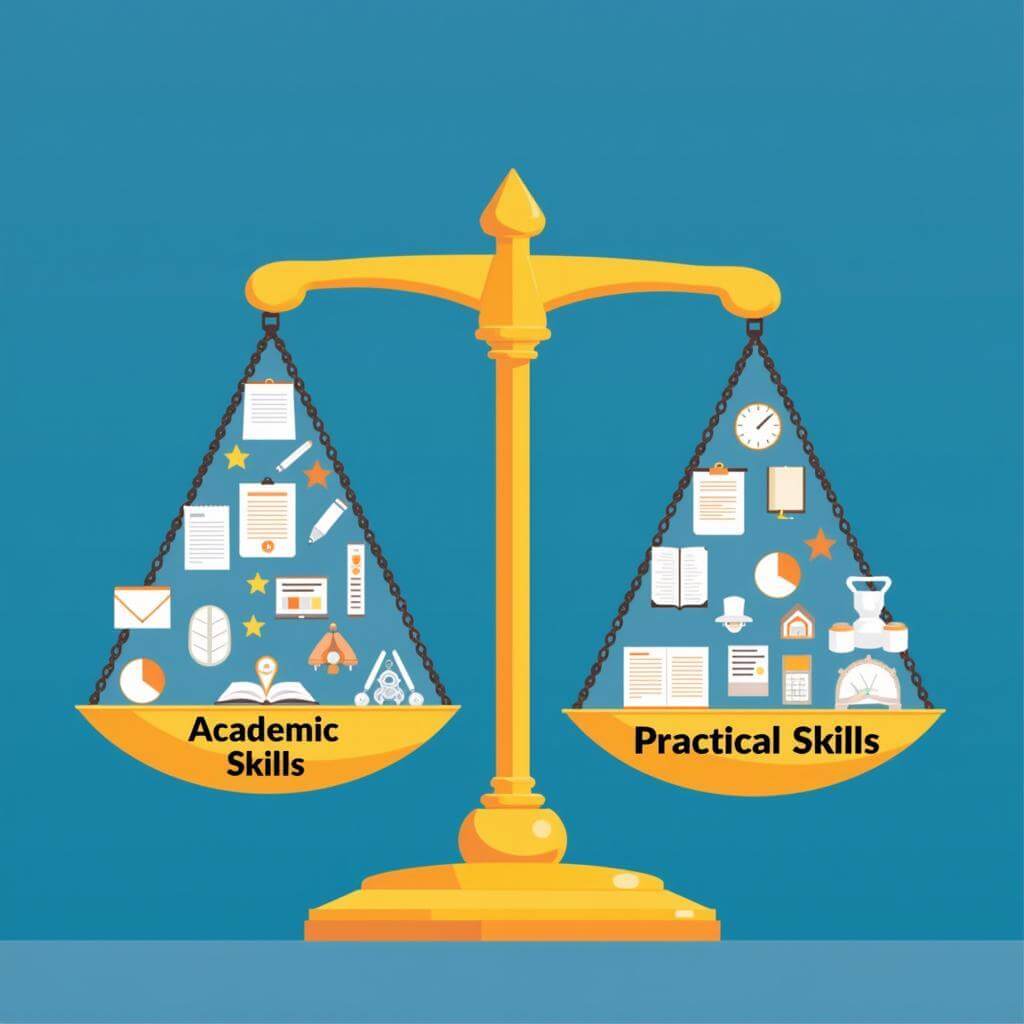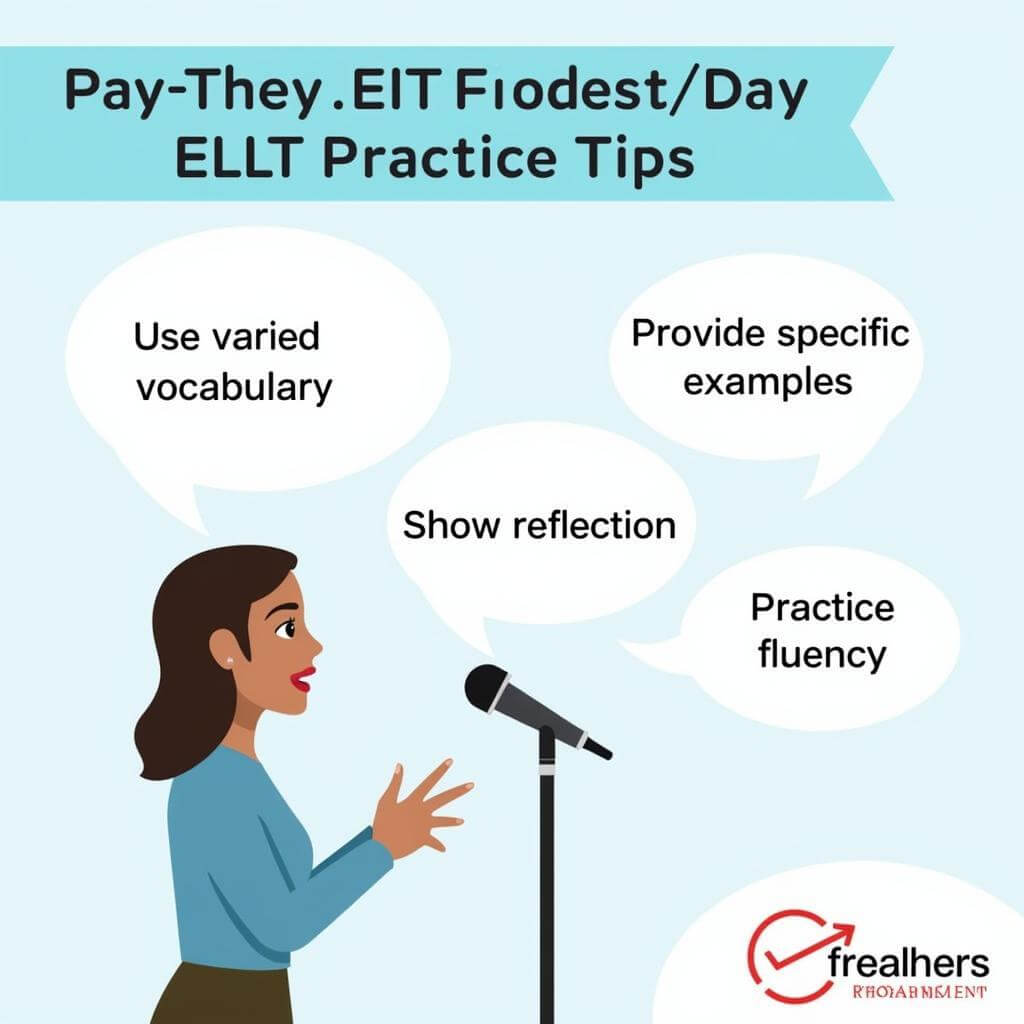The topic of describing a skill you have been practicing is a common one in IELTS Speaking tests. It’s a versatile subject that allows candidates to showcase their language abilities while discussing personal experiences. This theme has appeared frequently in past exams and is likely to remain relevant in future tests.
Part 1: Introduction and Interview
In this section, the examiner may ask questions such as:
- What skill have you been working on recently?
- How long have you been practicing this skill?
- Why did you choose to develop this particular skill?
Let’s look at a sample answer for the first question:
Examiner: What skill have you been working on recently?
Candidate (Band 6-7): I’ve been practicing my cooking skills lately. I’ve always enjoyed eating good food, so I thought it would be great to learn how to make some dishes myself. It’s been a fun and rewarding experience so far.
Candidate (Band 8-9): Recently, I’ve been honing my public speaking skills. I’ve always been fascinated by the art of effective communication, and I believe that mastering public speaking can be a game-changer in both personal and professional contexts. It’s been an incredibly enriching journey that has pushed me out of my comfort zone and boosted my confidence significantly.
describe a trip you are planning to take soon
Part 2: Long Turn
Cue Card
Describe a skill you have been practicing
You should say:
- What the skill is
- How long you have been practicing it
- Why you decided to practice this skill
- And explain how you feel about practicing this skill
Sample Answer (Band 6-7)
The skill I’ve been practicing is playing the guitar. I started learning about six months ago because I’ve always loved music and wanted to be able to play my favorite songs. I decided to learn guitar specifically because it’s portable and versatile – you can play all kinds of music on it.
I practice for about 30 minutes every day after work. At first, it was really challenging to get my fingers to move correctly on the strings, but now I’m starting to feel more comfortable. I can play a few simple songs, which makes me feel proud.
I feel really good about practicing this skill. It’s a great way to relax after a long day, and I like seeing my progress over time. Sometimes it can be frustrating when I can’t get a chord right, but overall, it’s very rewarding. I’m looking forward to getting better and maybe even playing for friends someday.
Sample Answer (Band 8-9)
The skill I’ve been diligently honing is creative writing, specifically in the realm of short story composition. I’ve been immersing myself in this craft for approximately 18 months now, and it’s been an incredibly enlightening journey.
My decision to delve into creative writing stemmed from a lifelong passion for literature and a desire to channel my imagination into tangible narratives. I’ve always been an avid reader, and I found myself increasingly drawn to the intricacies of storytelling. This fascination, coupled with a need for a creative outlet, propelled me to take the plunge into writing.
I typically dedicate about two hours each evening to my writing practice. This involves a range of activities, from free writing exercises to crafting elaborate plot outlines and developing complex characters. I’ve also joined a local writers’ group, which has been instrumental in providing constructive feedback and motivation.
The process of practicing this skill has been nothing short of transformative. It’s challenged me intellectually and emotionally, pushing me to explore the depths of my creativity and confront my own vulnerabilities. There’s an indescribable sense of fulfillment when I manage to articulate an abstract idea into a coherent narrative.
However, it’s not without its challenges. Writer’s block can be frustratingly persistent, and there are days when words seem to elude me entirely. Yet, these obstacles have taught me the value of perseverance and the importance of embracing the creative process in its entirety.
Overall, I find the practice of creative writing to be profoundly rewarding. It’s not just about honing a skill; it’s about discovering a part of myself I didn’t know existed. Each story I write feels like a small victory, a tangible manifestation of my growth as both a writer and an individual.
 Creative writing skill for IELTS speaking practice
Creative writing skill for IELTS speaking practice
Follow-up Questions
- How do you stay motivated to continue practicing this skill?
- Have you faced any challenges while learning this skill?
Sample Answer (Band 6-7):
I stay motivated by setting small goals for myself, like learning a new song each week. It helps me see my progress. The main challenge I’ve faced is finding time to practice regularly with my busy schedule.
Sample Answer (Band 8-9):
To maintain my motivation, I’ve implemented a multifaceted approach. Firstly, I set tangible, achievable goals for myself, such as completing a short story every month or experimenting with different genres. Additionally, I actively engage with the writing community through online forums and local workshops, which provides a constant source of inspiration and constructive feedback.
The challenges I’ve encountered have been both technical and psychological. On the technical side, mastering the nuances of dialogue and perfecting story pacing have been ongoing hurdles. Psychologically, overcoming self-doubt and learning to embrace constructive criticism have been significant obstacles. However, I view these challenges as integral parts of the learning process, each one contributing to my growth as a writer.
Part 3: Two-way Discussion
Examiner: How important do you think it is for people to continuously learn new skills throughout their lives?
Candidate (Band 6-7): I think it’s very important for people to keep learning new skills. The world is always changing, especially with technology, so we need to keep up. Learning new things can also make life more interesting and help us in our careers.
Candidate (Band 8-9): I believe that continuous skill acquisition is absolutely crucial in today’s rapidly evolving world. The pace of technological advancement and societal change necessitates a mindset of lifelong learning. Cultivating new skills not only enhances one’s employability and adaptability in the job market but also contributes significantly to personal growth and cognitive well-being.
Engaging in ongoing learning has been shown to stave off cognitive decline as we age and promotes neuroplasticity. Moreover, the process of acquiring new skills often leads to increased self-confidence and a sense of personal fulfillment. In essence, embracing continuous learning is not just about staying relevant professionally; it’s about maintaining an engaged, vibrant, and adaptable approach to life in general.
describe a family member you most admire
Examiner: Do you think schools should focus more on teaching practical skills rather than academic subjects?
Candidate (Band 6-7): I think schools should teach both academic subjects and practical skills. Academic subjects are important for getting into university, but practical skills can be really useful in real life. Maybe schools could find a balance between the two.
Candidate (Band 8-9): This is a complex issue that requires a nuanced approach. While academic subjects form the cornerstone of traditional education and provide a crucial foundation for higher learning and critical thinking, there’s a growing recognition of the importance of practical skills in today’s rapidly changing world.
I believe the ideal solution lies in striking a balance between academic and practical education. Schools should aim to integrate practical skills into the existing curriculum rather than viewing it as an either/or situation. For instance, project-based learning can bridge the gap between theoretical knowledge and practical application, allowing students to develop both simultaneously.
Moreover, we should broaden our definition of practical skills to include things like financial literacy, digital competence, and emotional intelligence – skills that are increasingly vital in both personal and professional spheres. By adopting this holistic approach, schools can better equip students to navigate the complexities of modern life while still providing a strong academic foundation.
Ultimately, the goal should be to produce well-rounded individuals who are not only knowledgeable but also adaptable and capable of applying their learning to real-world situations.
 Balancing academic and practical skills in education
Balancing academic and practical skills in education
Key Vocabulary and Phrases for High Scores
-
Hone (verb) /həʊn/ – to improve or perfect a skill over time
Example: She’s been honing her photography skills for years. -
Diligently (adverb) /ˈdɪlɪdʒəntli/ – in a way that shows care and effort in work or duties
Example: He diligently practiced the piano every day for an hour. -
Immerse oneself (phrasal verb) /ɪˈmɜːs wʌnˈself/ – to become completely involved in something
Example: To improve his language skills, he immersed himself in Spanish culture. -
Channel (verb) /ˈtʃænl/ – to direct towards a particular end or object
Example: She channels her creativity into writing short stories. -
Propel (verb) /prəˈpel/ – to drive, push, or cause to move forward
Example: His passion for music propelled him to learn multiple instruments.
Examiner’s Advice
To achieve a high score in the IELTS Speaking test when describing a skill you’ve been practicing:
-
Use a range of vocabulary: Incorporate advanced words and phrases related to skill development and learning processes.
-
Provide specific examples: Don’t just state facts; illustrate your points with personal experiences and detailed examples.
-
Show reflection: Demonstrate your ability to analyze your learning process, challenges, and achievements.
-
Use varied sentence structures: Mix simple and complex sentences to showcase your language proficiency.
-
Stay relevant: Always keep your answers focused on the question asked, providing comprehensive yet concise responses.
-
Practice fluency: Work on speaking smoothly without long pauses or hesitations.
-
Develop your ideas: Don’t just give short answers. Expand on your thoughts and provide reasoning for your opinions.
Remember, consistent practice and exposure to English in various contexts will significantly improve your performance in the IELTS Speaking test.
describe an app you use frequently on your phone
 IELTS Speaking practice tips
IELTS Speaking practice tips
By following these guidelines and continuously practicing, you’ll be well-prepared to discuss any skill you’ve been working on in your IELTS Speaking test. Remember, the key is to demonstrate your English language proficiency while providing thoughtful and engaging responses.


